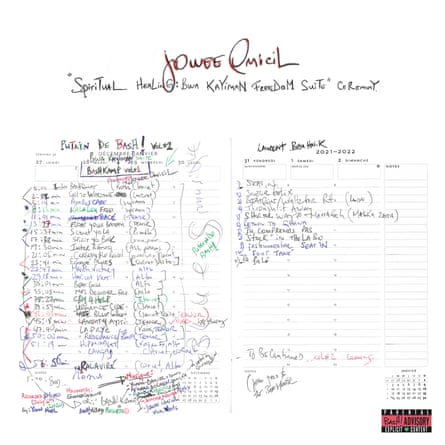In August 1791, a group of enslaved Haitians met in the woods of Bois Caïman, on the north coast of Haiti, and conducted a secret Vodou ceremony that planted the seeds for the Haitian Revolution. This collective ritual, which would go on to inspire a mass uprising, now forms the energetic inspiration for Haitian saxophonist Jowee Omicil’s latest album, Spiritual Healing: Bwa Kayiman Freedom Suite. Over an hour, Omicil transposes the imagined energy of the ceremony into a free jazz interpretation, switching between several woodwinds and brass while accompanied by percussion, keys and bass.
The album opens minimally, with Omicil vocalising over plaintive snatches of saxophone melody, guttural bass clarinet and rattles of percussionist Yoann Danier’s ka drum. Sweeping his hand across the surface of the drum as if replicating the rustle of forest leaves, Danier situates the listener in the imagined setting of Bois Caïman before Omicil punctures the soothing soundscape with a clarion call on cornet. That forceful entry signifies much of what is to come: compositions that build a certain comfortable mood before switching tack and upending expectations.
On tracks such as Spirit Yo Bak, for instance, a rapid polyrhythmic drum and ka groove is played with intensity before pianist Randy Kerber drowns out the percussion to deliver a slow, introspective solo. Conversely, Blue Cotton starts soft with Omicil’s breathy flute laying down a steady melody and then picks up into a frantic tangle of saxophone lines over drummer Arnaud Dolmen’s cymbal smashes.
It all works to jolt listeners to attention, keeping us poised for this sense of change and tension – the risk of uprising. His band never fully explode into the spiritually cleansing, life-reimagining free jazz of genre pioneers such as Albert Ayler; Omicil instead invites us to enter a fidgety space of possibility. It’s not always easy to listen to, but it is exciting, its sudden ructions suggesting that revolution is always an option, and closer than we might think.
Also out this month
On Aron & the Jeri Jeri Band’s debut collaboration, Dama Bëgga Ñibi (Urban Trout Records), New Zealand producer Aron Ottignon and the Senegalese group produce an infectiously danceable album of glittering electronic melodies and syncopated rhythms, all anchored by a range of powerful vocalists. French-Beninoise vocalist Mina Agossi delivers a downtempo fusion of jazz improvisation and electronic textures on her latest album Lonely Whales (Alchimie Records) – the synth pads and sound design can be too subtle at times, but on the title track it produces a perfectly angular foundation for Agossi’s nimble vocals. Flamenco guitarist Jacob Gurevitsch releases El Terreno (Music for Dreams), a minimal yet moving collection of finger-picked melodies, featuring the expressive playing of Cuban jazz trumpeter Arturo Sandoval on highlight For Your Love.

